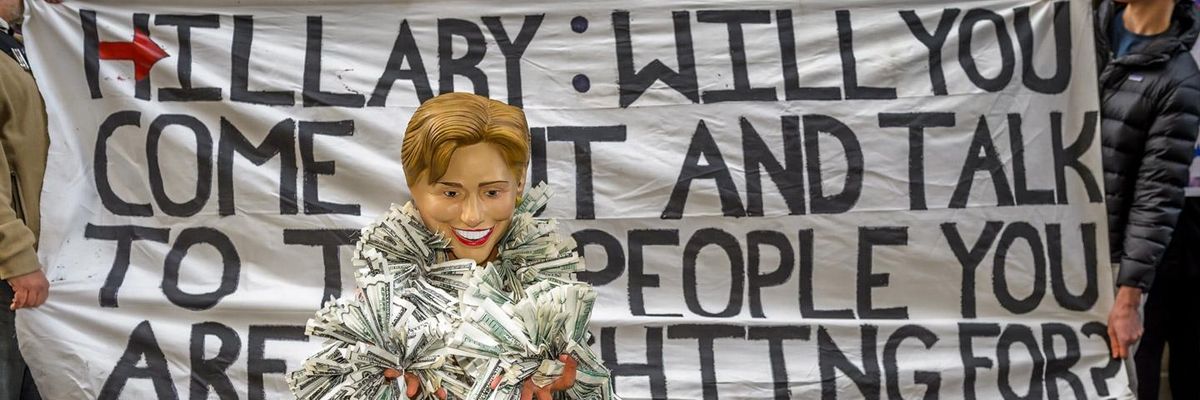
To Protect Hillary Clinton, Democrats Wage War on Their Own Core Citizens United Argument
Supreme Court's 5-4 decision in Citizens United was depicted by Democrats as the root of all political evil. But now, the core argument embraced by the Court's conservatives to justify their ruling has taken center stage in the Democratic primary between Hillary Clinton and Bernie Sanders -- because Clinton supporters, to defend the huge amount of corporate cash on which their candidate is relying, frequently invoke that very same reasoning.
Supreme Court's 5-4 decision in Citizens United was depicted by Democrats as the root of all political evil. But now, the core argument embraced by the Court's conservatives to justify their ruling has taken center stage in the Democratic primary between Hillary Clinton and Bernie Sanders -- because Clinton supporters, to defend the huge amount of corporate cash on which their candidate is relying, frequently invoke that very same reasoning.
The crux of the Citizens United ruling was that a legal ban on independent corporate campaign expenditures constituted a limit on political speech without sufficient justification, and thus violated the First Amendment's free speech guarantee. A primary argument of the Obama Justice Department and Democrats generally in order to uphold that campaign finance law was that corporate expenditures are so corrupting of the political process that limits are justified even if they infringe free speech. In rejecting that view, this was the key argument of Justice Anthony Kennedy, writing for the five-judge conservative majority (emphasis added):
For the reasons explained above, we now conclude that independent expenditures, including those made by corporations, do not give rise to corruption or the appearance of corruption.
Does that sound familiar? It should. That key argument of the right-wing justices in Citizens United has now become the key argument of the Clinton campaign and its media supporters to justify her personal and political receipt of millions upon millions of dollars in corporate money: "Expenditures, including those made by corporations, do not give rise to corruption or the appearance of corruption" -- at least when the candidate in question is Hillary Clinton.
Indeed, the Clinton argument actually goes well beyond the Court's conservatives: In Citizens United, the right-wing justices merely denied the corrupting effect of independent expenditures (i.e., ones not coordinated with the campaign). But Clinton supporters in 2016 are denying the corrupting effect of direct campaign donations by large banks and corporations and, even worse, huge speaking fees paid to an individual politician shortly before and after that person holds massive political power.
Another critical aspect of the right-wing majority argument in Citizens United was that actual corruption requires proof of a "quid pro quo" arrangement: meaning that the politician is paid to vote a certain way (which is, basically, bribery). Prior precedent, said the Citizens United majority, "was limited to quid pro quo corruption," quoting a prior case as holding that "the hallmark of corruption is the financial quid pro quo: dollars for political favors."
Does that sound familiar? It should. That, too, has become a core Clinton-supporting argument: Look, if you can't prove that Hillary changed her vote in exchange for Goldman Sachs speaking fees or JPMorgan Chase donations (and just by the way, Elizabeth Warren believes she can prove that), then you can't prove that these donations are corrupting. After all, argue Clinton supporters (echoing the Citizens United majority), "the hallmark of corruption is the financial quid pro quo: dollars for political favors."
Read the full article at The Intercept.
An Urgent Message From Our Co-Founder
Dear Common Dreams reader, The U.S. is on a fast track to authoritarianism like nothing I've ever seen. Meanwhile, corporate news outlets are utterly capitulating to Trump, twisting their coverage to avoid drawing his ire while lining up to stuff cash in his pockets. That's why I believe that Common Dreams is doing the best and most consequential reporting that we've ever done. Our small but mighty team is a progressive reporting powerhouse, covering the news every day that the corporate media never will. Our mission has always been simple: To inform. To inspire. And to ignite change for the common good. Now here's the key piece that I want all our readers to understand: None of this would be possible without your financial support. That's not just some fundraising cliche. It's the absolute and literal truth. We don't accept corporate advertising and never will. We don't have a paywall because we don't think people should be blocked from critical news based on their ability to pay. Everything we do is funded by the donations of readers like you. The final deadline for our crucial Summer Campaign fundraising drive is just days away, and we’re falling short of our must-hit goal. Will you donate now to help power the nonprofit, independent reporting of Common Dreams? Thank you for being a vital member of our community. Together, we can keep independent journalism alive when it’s needed most. - Craig Brown, Co-founder |
Supreme Court's 5-4 decision in Citizens United was depicted by Democrats as the root of all political evil. But now, the core argument embraced by the Court's conservatives to justify their ruling has taken center stage in the Democratic primary between Hillary Clinton and Bernie Sanders -- because Clinton supporters, to defend the huge amount of corporate cash on which their candidate is relying, frequently invoke that very same reasoning.
The crux of the Citizens United ruling was that a legal ban on independent corporate campaign expenditures constituted a limit on political speech without sufficient justification, and thus violated the First Amendment's free speech guarantee. A primary argument of the Obama Justice Department and Democrats generally in order to uphold that campaign finance law was that corporate expenditures are so corrupting of the political process that limits are justified even if they infringe free speech. In rejecting that view, this was the key argument of Justice Anthony Kennedy, writing for the five-judge conservative majority (emphasis added):
For the reasons explained above, we now conclude that independent expenditures, including those made by corporations, do not give rise to corruption or the appearance of corruption.
Does that sound familiar? It should. That key argument of the right-wing justices in Citizens United has now become the key argument of the Clinton campaign and its media supporters to justify her personal and political receipt of millions upon millions of dollars in corporate money: "Expenditures, including those made by corporations, do not give rise to corruption or the appearance of corruption" -- at least when the candidate in question is Hillary Clinton.
Indeed, the Clinton argument actually goes well beyond the Court's conservatives: In Citizens United, the right-wing justices merely denied the corrupting effect of independent expenditures (i.e., ones not coordinated with the campaign). But Clinton supporters in 2016 are denying the corrupting effect of direct campaign donations by large banks and corporations and, even worse, huge speaking fees paid to an individual politician shortly before and after that person holds massive political power.
Another critical aspect of the right-wing majority argument in Citizens United was that actual corruption requires proof of a "quid pro quo" arrangement: meaning that the politician is paid to vote a certain way (which is, basically, bribery). Prior precedent, said the Citizens United majority, "was limited to quid pro quo corruption," quoting a prior case as holding that "the hallmark of corruption is the financial quid pro quo: dollars for political favors."
Does that sound familiar? It should. That, too, has become a core Clinton-supporting argument: Look, if you can't prove that Hillary changed her vote in exchange for Goldman Sachs speaking fees or JPMorgan Chase donations (and just by the way, Elizabeth Warren believes she can prove that), then you can't prove that these donations are corrupting. After all, argue Clinton supporters (echoing the Citizens United majority), "the hallmark of corruption is the financial quid pro quo: dollars for political favors."
Read the full article at The Intercept.
Supreme Court's 5-4 decision in Citizens United was depicted by Democrats as the root of all political evil. But now, the core argument embraced by the Court's conservatives to justify their ruling has taken center stage in the Democratic primary between Hillary Clinton and Bernie Sanders -- because Clinton supporters, to defend the huge amount of corporate cash on which their candidate is relying, frequently invoke that very same reasoning.
The crux of the Citizens United ruling was that a legal ban on independent corporate campaign expenditures constituted a limit on political speech without sufficient justification, and thus violated the First Amendment's free speech guarantee. A primary argument of the Obama Justice Department and Democrats generally in order to uphold that campaign finance law was that corporate expenditures are so corrupting of the political process that limits are justified even if they infringe free speech. In rejecting that view, this was the key argument of Justice Anthony Kennedy, writing for the five-judge conservative majority (emphasis added):
For the reasons explained above, we now conclude that independent expenditures, including those made by corporations, do not give rise to corruption or the appearance of corruption.
Does that sound familiar? It should. That key argument of the right-wing justices in Citizens United has now become the key argument of the Clinton campaign and its media supporters to justify her personal and political receipt of millions upon millions of dollars in corporate money: "Expenditures, including those made by corporations, do not give rise to corruption or the appearance of corruption" -- at least when the candidate in question is Hillary Clinton.
Indeed, the Clinton argument actually goes well beyond the Court's conservatives: In Citizens United, the right-wing justices merely denied the corrupting effect of independent expenditures (i.e., ones not coordinated with the campaign). But Clinton supporters in 2016 are denying the corrupting effect of direct campaign donations by large banks and corporations and, even worse, huge speaking fees paid to an individual politician shortly before and after that person holds massive political power.
Another critical aspect of the right-wing majority argument in Citizens United was that actual corruption requires proof of a "quid pro quo" arrangement: meaning that the politician is paid to vote a certain way (which is, basically, bribery). Prior precedent, said the Citizens United majority, "was limited to quid pro quo corruption," quoting a prior case as holding that "the hallmark of corruption is the financial quid pro quo: dollars for political favors."
Does that sound familiar? It should. That, too, has become a core Clinton-supporting argument: Look, if you can't prove that Hillary changed her vote in exchange for Goldman Sachs speaking fees or JPMorgan Chase donations (and just by the way, Elizabeth Warren believes she can prove that), then you can't prove that these donations are corrupting. After all, argue Clinton supporters (echoing the Citizens United majority), "the hallmark of corruption is the financial quid pro quo: dollars for political favors."
Read the full article at The Intercept.

